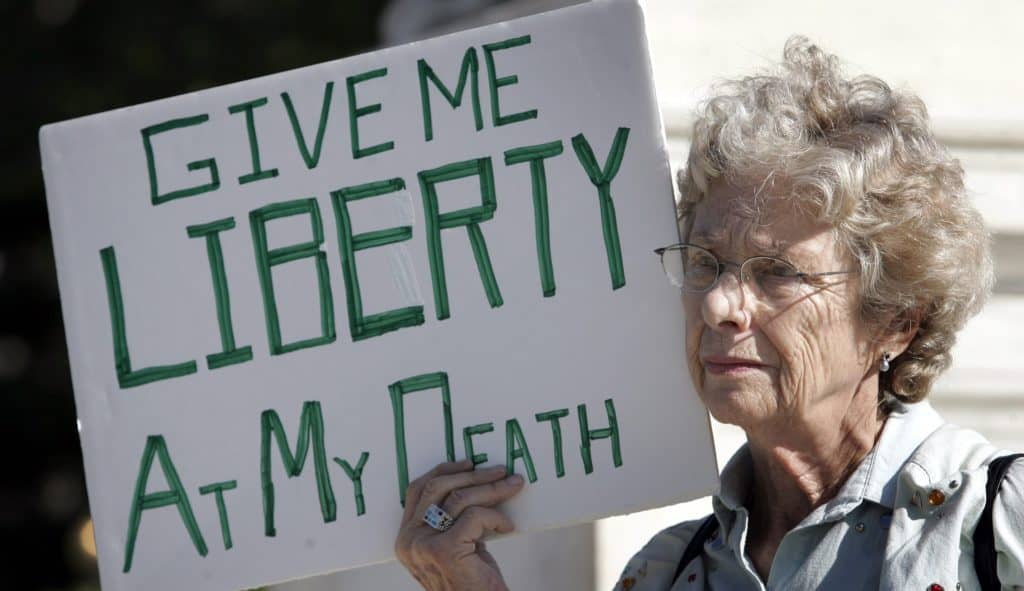
By Dan Murphy
After hearing about a shooting at Westchester Medical Center last week, a friend of mine said, “You don’t see that in Westchester often.” But with the elderly population in Westchester increasing, the murder-suicide of Richard DeLucia and his wife, Ann, may become a common occurrence unless our county, state and country can have an open and honest discussion about end-of-life decisions, and death and dying.
Richard DeLucia had watched for years as his wife, Ann, became terminally ill after a series of strokes, and he had heart bypass surgery. They were “only” 70 and 71 years old when DeLucia ended their lives, when he shot the love of his life and then turned the gun on himself.
A note left behind by DeLucia indicated that he couldn’t bear to see his wife in pain and wanted to end her suffering. The DeLucia’s grew up in Yonkers and lived in a retirement community in Jefferson Valley/Yorktown before they died.
The problem in today’s society is that most people are afraid to discuss the fact that after serious or terminal illness, sometimes patients – with the help of loved ones, family and friends – decide that it is time to end their lives. Currently and legally, the only way that can be done is through palliative care, which includes hospice, in which a patient decides to end chemotherapy or other painful treatments and returns home to live out the remainder their life in common surroundings in peace with the ones they love.
The Westchester End of Life Coalition, provided the following story about a mother who didn’t want to go back to the hospital again:
“Joan, a widow, was on her fourth hospitalization of the past eight months. Each time she was discharged, she was weaker than the time before. It was hard for her to live independently. She had several medical problems, none of which were life threatening, but combined, they seriously diminished her ability to do the things she wanted to and her quality of life. Joan was frustrated because she was not getting better and did not understand what the future would hold for her. She was tired and did not want to live like this: moving between hospital, rehabilitation facility and home, never recovering sufficiently to live the way she wanted.
“The nurse practitioner from the team met with Joan, who said that she didn’t want to be hospitalized again and wanted to be home. She understood that declining to be hospitalized again might shorten her life, but she wanted her care to be about helping her enjoy her life – at home, spending time with family and friends. Joan decided hospice care was the best way for her to live the way she wanted to, and the palliative care team was able to connect her with different hospice organizations, so she could choose the right one for her.”
In addition to hospice and palliative care, some are asking for more consideration, and compassion be given to those who are terminally ill and want to end their suffering as soon as possible. One Westchester state legislator who is trying to have a discussion with the people of Westchester and New York State about a very difficult issue is Assemblywoman Amy Paulin.
Paulin is one of 23 co-sponsors of the Medical Aid in Dying Act, which would give mentally capable, terminally-ill adults with six months or less to live the option to request a prescription medication they can choose to take in order to end unbearable suffering by gently dying in their sleep. The bill was introduced last year and has a Senate sponsor, but has died in the Health Committee for the past two years.
“If I am terminally ill, I should be able to choose to end my life calmly, peacefully and in a dignified way, at a time and in a setting I choose where I am surrounded by those I love,” said Paulin. “That is what my bill is about.”
Insurance issues are also one of the reasons the bill hasn’t made it to the governor’s desk for his signature. A bill prohibiting insurance companies from covering “physician assisted suicide,” including medical-aid-in-dying drugs, was also introduced in the State Senate the 2017 session and referred to the Insurance Committee. The Medical Society of the State of New York opposes the bill.
The following organizations have endorsed the medical aid-in-dying legislation: New York State Academy of Family Physicians, NYS Public Health Association, New York Statewide Senior Action Council, and the League of Women Voters of New York.
A recent Quinnipiac University poll shows that 63 percent of New York residents support medical aid in dying.
It’s been almost 20 years since Dr. Jack Kevorkian helped terminally ill patients end their life. Since then, there has been no resolution – in our Legislatures or in the courts – determining when a person can end their own life.
We thank Assemblywoman Paulin for having the courage to do so and be one of the few in Westchester to stand up and try to give that very personal option, to those who want to die in peace and with dignity. If nothing is done, then look for more shootings like the one that just took place at Westchester Medical Center.





